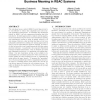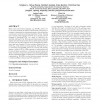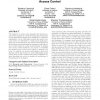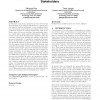119
click to vote
SACMAT
2009
ACM
15 years 6 months ago
2009
ACM
The role-based access control (RBAC) model has proven to be cost effective to reduce the complexity and costs of access permission management. To maximize the advantages offered...
139
click to vote
SACMAT
2009
ACM
15 years 8 months ago
2009
ACM
Many access control policy languages, e.g., XACML, allow a policy to contain multiple sub-policies, and the result of the policy on a request is determined by combining the result...
SACMAT
2009
ACM
15 years 8 months ago
2009
ACM
Role-based provisioning has been adopted as a standard component in leading Identity Management products due to its low administration cost. However, the cost of adjusting existin...
118
click to vote
SACMAT
2009
ACM
15 years 8 months ago
2009
ACM
XACML does not natively support RBAC and even the specialized XACML profiles are not able to support many relevant constraints such as static and dynamic separation of duty. Exte...
156
click to vote
SACMAT
2009
ACM
15 years 8 months ago
2009
ACM
An access control system is often viewed as a state transition system. Given a set of access control policies, a general safety requirement in such a system is to determine whethe...
125
click to vote
SACMAT
2009
ACM
15 years 8 months ago
2009
ACM
Modern operating systems primarily use Discretionary Access Control (DAC) to protect files and other operating system resources. DAC mechanisms are more user-friendly than Mandat...
122
click to vote
SACMAT
2009
ACM
15 years 8 months ago
2009
ACM
The existence of on-line social networks that include person specific information creates interesting opportunities for various applications ranging from marketing to community o...
114
click to vote
SACMAT
2009
ACM
15 years 8 months ago
2009
ACM
This panel discusses specific challenges in the usability of access control technologies and new opportunities for research. The questions vary from “Why nobody, even experts, ...
110
click to vote
SACMAT
2009
ACM
15 years 8 months ago
2009
ACM
A number of research systems have demonstrated the benefits of accompanying each request with a machine-checkable proof that the request complies with access-control policy — a...
153
click to vote
SACMAT
2009
ACM
15 years 8 months ago
2009
ACM
In this paper, we present a mandatory access control system that uses input from multiple stakeholders to compose policies based on runtime information. In the emerging ubiquitous...




